So I’ve been on a bit of a language kick lately, having finally finished the French lessons on Duolingo (check out a review here), and following it up with a million French language conversational meetups in the area. Duolingo has been making headlines all over the place, but several other language-learning services exist (sometimes free, sometimes not), for those looking for an alternative.
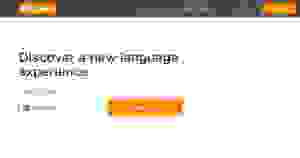
One of them is Babbel, which is a paid service, costing anywhere from $6.95 to $12.95 per month (per language), with costs going down if you pay for several months at once. It has a 20-day money-back guarantee, several free introductory lessons, and over a dozen languages.
I used it to review my rudimentary Russian skills, which is a language Duolingo does not currently offer (though it will be added in late 2015), and also to evaluate it as a paid alternative that might potentially address some of Duolingo’s explanatory shortcomings. As is the case with anything that costs money, it has to be better than the free alternative. And not just better…but at least $6.95 per month better.
And after going through the entirety of the Russian lessons available on the site, I can definitively say:
It starts out rrrrrrreally well…and then goes tragically downhill shortly thereafter.
Sigh.
Things Babbel does amazingly well
I was really impressed with Babbel at first. Everything about it (in the beginning) is superior to Duolingo. If you’re frustrated with Duolingo’s translation-heavy and explanation-light methods, Babbel will be a wonderful breath of fresh air, because:
1) Babbel actually teaches you things
Instead of just throwing endless exercises at you, Babbel provides in-depth explanations of grammatical concepts; in the case of Russian specifically, this includes things like cases, verb conjugation, adjective/noun gender/number/case agreement, and other nuances, as well as a thorough introduction to the Cyrillic alphabet, and accompanying keyboard techniques.
After introducing you to a new concept, Babbel presents you with relevant exercises, often consisting of single-letter fill-in-the-blank lessons focusing on this new concept exclusively:
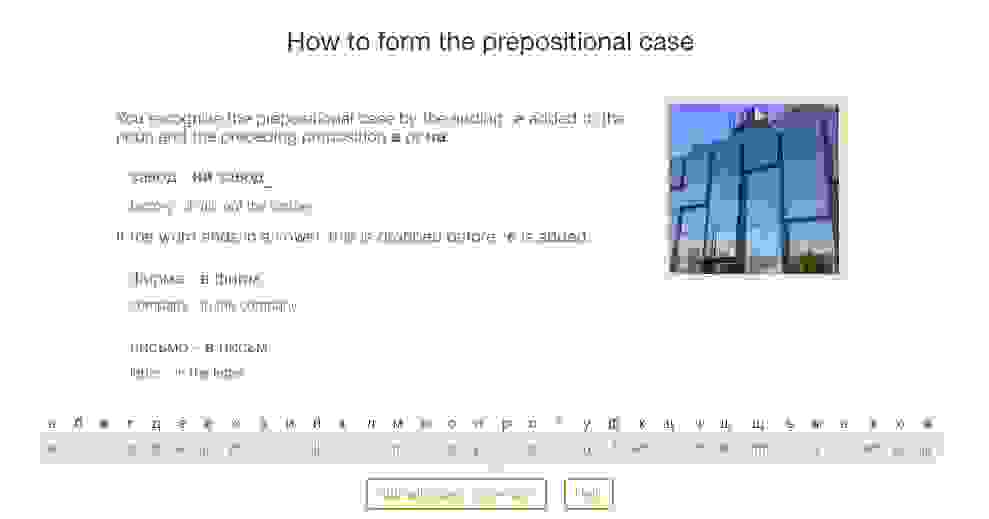
After that, you’ll move on to complete words, then complete sentences.
It’s a million times faster than the Duolingo method of “just throw exercises at them until they get it.” With Duolingo, I had to Google things I couldn’t understand, because Duolingo simply wouldn’t explain them at all.
Babbel actually guides you through these concepts, with no supplementary materials needed. Not only is this far less annoying, but it’s also significantly faster, since you won’t waste time stumbling through inscrutable grammatical rules without understanding what’s going on, in a trial-and-error hamster wheel of inefficiency.
Which leads me to another advantage of Babbel’s methods:
2) Vastly superior iteration techniques
One of the main problems with Duolingo is that it is endlessly repetitive, and not in a particularly efficient way. Repetition is important, but Duolingo often asks you to translate complete sentences (often of a dozen words or more), with perhaps only one or two new words within the sentence that you actually need to practice…so you spend a lot of time typing, but not much time learning.
Verb conjugation is one of the more problematic areas, especially in Romance languages, which often have dozens of different ways to conjugate a single verb (English examples being I go, he goes, I went, I have gone, and so on), but in many languages, it’s often just a few letters at the end of each word that change.
This is a perfect example of how translating full sentences is a huge waste of time, since you’re usually working on memorizing just the last few letters of a single word. So…why not practice just those letters?
Like this:
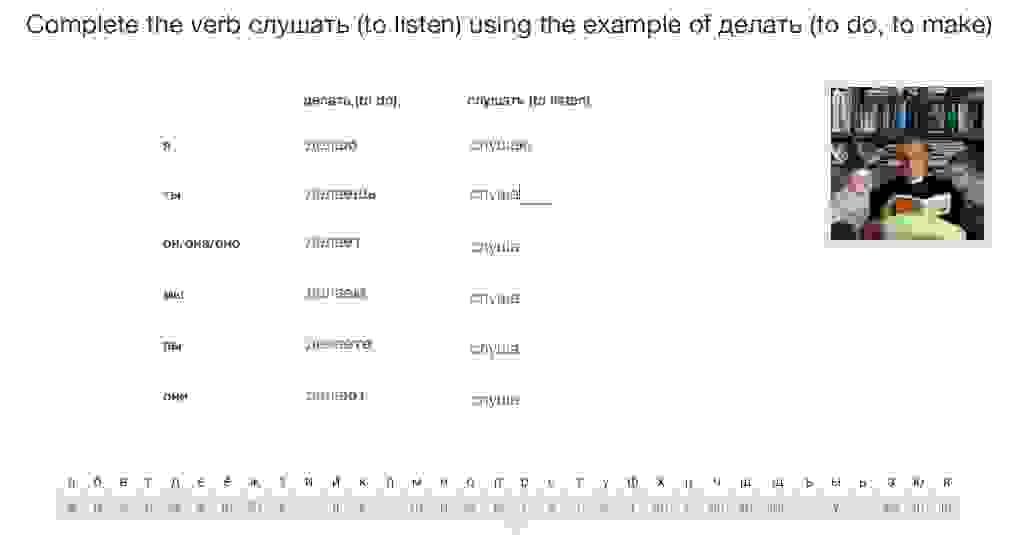
With Babbel, you’ll often have exercises that focus just on the relevant letters at the end of the verb, which is the only part you need to practice, and thus a more efficient form of repetition. After that, exercises get longer, such as those that ask you to write the entire word:
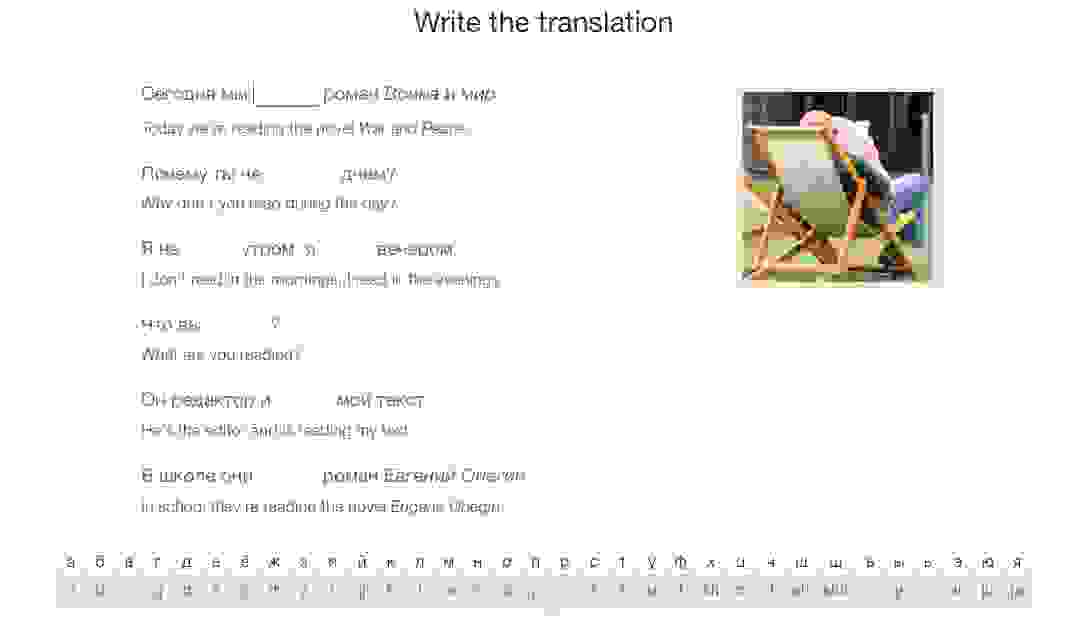
This still provides rapid repetition of relevant information (verb conjugation, in this example), while still providing reading and listening practice for a complete sentence, because you can see it, and it’ll read it out loud to you.
It’s soooooooo much faster. By incorporating these hyper-focused, fill-in-the-blank exercises before moving on to complete sentences, Babbel rapidly reiterates on the new concept, giving you lots of practice in just a few seconds, instead of requiring you to type out endless complete sentences, the way Duolingo does.
You’re also just typing a whole lot less. Quite a few times I had to stop using Duolingo because my hands got tired. This never happened with Babbel, and if you’re in a hurry to make rapid progress, this is a very big deal.
3) Beginner vocabulary is at the beginning
I shouldn’t really have to mention this one, and I’m only doing so because Duolingo did such a weird job with it. Babbel actually includes beginner phrases at the beginning. You know, like they should?
I don’t think I learned how to ask “where’s the toilet” with Duolingo until I was about 6 months in. Basic phrases like “hello, what’s your name, where are you from, what do you do, how much does it cost,” and so forth are sprinkled throughout the lessons, instead of being front-loaded in the beginning. This means that new speakers can use Duolingo for a long time before learning much of anything practical.
It’s not easy to do this correctly (and Babbel had a lot of basic words hidden throughout later exercises as well), but at least they start out with “hello, how are you, good, thanks, where are you from,” and so on. It’s not perfect (and nothing could be, because you have to learn a lot in order to have a worthwhile conversation), but at least it has some of those “survival phrases” up front.
4) Good scope
By the time I had finished with Babbel’s Russian lessons, I had been presented with 2,447 words. I have heard on more than one occasion that 2,000 words is the conversational sweet spot, allowing you to communicate with native speakers without significant trouble, but not enough to win you any poetry awards.
This was more than Duolingo (which taught 1,874 words in French, though it looks like they’ve added more since then), but I think the discrepancy is largely due to Babbel including a lot of specialized vocabulary, like the word for “hardware.” I think the intention is so that professionals can use Babbel as a potential job-training program, so they can learn industry-specific vocabulary if they’re moving to another country for work. For most people, these exercises will be unnecessary, but it’s nice to see them included for the specific users who need it.
Things Babbel does amazingly poorly
Sadly, this amazingly strong start came to an abrupt end in an extraordinarily short amount of time. Every single advantage of Babbel completely evaporated after the beginner lessons.
I expect this may have happened because the Russian lessons simply aren’t as extensive as some of the other languages offered by Babbel, as Russian isn’t in demand in the way Spanish might be, and thus is more like a beta test version, instead of a real language course. I checked the scope of the German lessons and confirmed that, yes, Russian is simply not as extensive at the moment as others.
So should they have charged me the same price for incomplete lessons as they charge for complete ones?
Nope!
So here we are.
1) All the explanations disappear after the first few lessons
Remember all those incredibly helpful explanations of grammatical concepts that I mentioned distinguish Babbel from Duolingo and are extraordinary useful and time-saving and so on and so forth?
They disappear, fast. After the lessons labelled “Beginner’s Courses,” all those explanations are gone. What do we have instead?
Flash cards.
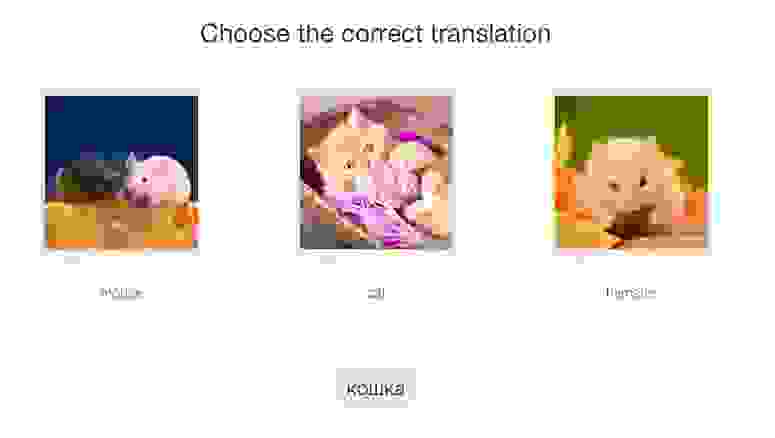
That. Is. All.
Seriously.
After the beginners’ courses, Babbel’s lessons (in Russian, anyway) consists exclusively of vocabulary drills, most often just one word at a time.
Occasionally they’ll have lengthier sentences, like these:
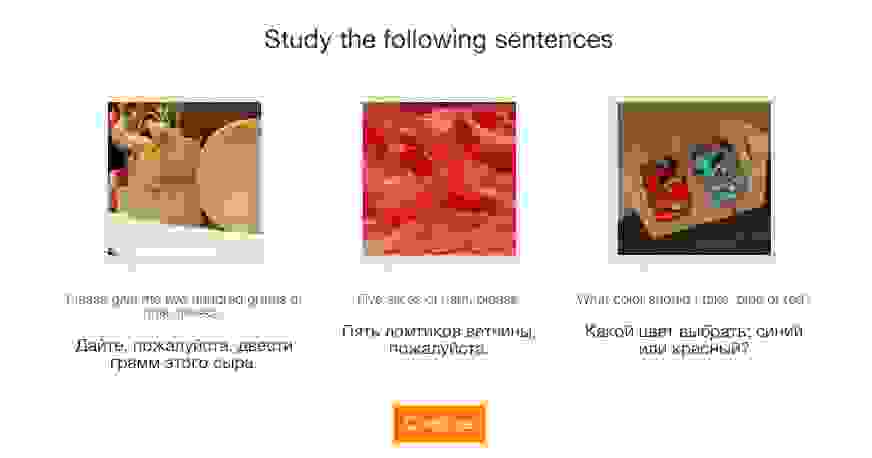
But there’s no further explanation of any grammatical concept, colloquial nuance, usage details…nothing. Just flash cards. Nothing else.
There’s absolutely zero further practice with verb conjugation, cases, adjective/noun agreement, or anything else, except for those full-sentence flash cards which make use of just one form at a time, which isn’t particularly conducive to reviewing all the other ones. By the time you’re done, you’ll probably have forgotten half of them.
I should point out that these vocabulary drills form the majority of Babbel’s Russian lessons at the moment, and while I’ve seen other languages that have far more extensive courses, there’s simply no reason they should have sold this course as a complete product alongside the others. Everything that was good about Babbel disappeared after the beginner lessons, and it consisted of nothing but flash-card-style vocabulary drills from there on out.
This is also true of the review exercises. Babbel keeps track of which words you need to practice, but handles this by giving you individual words in flash card form, meaning you don’t get full-sentence practice unless you repeat old lessons, and it’s kind of hard to remember which lessons would be good to practice again (whereas Duolingo helpfully indicates this by color-coding).
2) Lessons are simply incomplete
Quite a few important concepts were simply left out. The word for “hundred,” for example, is in there, but only in one of those pre-constructed sentences within a flash-card-style vocabulary drill, in the form of the word “two hundred.” As far as I can recall, this is the only time it tells you how to say that word. This is especially important in Russian, because the word changes based on how many hundreds there are, which they also don’t bother telling you. If you have to buy something for one hundred rubles, too bad.
It also presents you with both the perfect and imperfect forms of each verb, which is rather important in Russian, because you need to know which is which, and which one to use in which situation. They also don’t bother explaining the difference between perfect and imperfect verbs, which means it’s all just a complete waste of time anyway. Why bother asking people to memorize various forms of each verb if you don’t bother telling people what they mean?!
This is all just insane. Like…rrrrrrrreally insane. And it came as a major disappointment, especially after seeing how incredibly good Babbel was in the beginning.
3) Basic words are stuck in specialized vocabulary lessons
Remember how I said Babbel includes specialized vocabulary for industry-specific topics, so professionals can learn those particular words that might be necessary for communicating with international clients?
Those are also the lessons that include really basic vocabulary, like the word for “heavy.” You’d think the highly-specialized lessons should consist only of highly specialized words, so users can skip them if they’re not immediately relevant, but you have to go through them all, just to learn simple terms…while also spending extra time learning unnecessary words like “lawnmower.”
4) Minor quibbles
I won’t spend too much time on these, but I have a couple other minor issues:
I found Babbel’s progress indicators to be less immediately visible than Duolingo’s, which allows you to see exactly where you are, with color-coded lessons to indicate which ones have been mastered, and which ones need practice. Babbel has lessons-within-lessons, and it takes a little extra time to get where you need to go. Duolingo has lessons-within-lessons too, but it’s easier to pick up where you left off.
Babbel also has an option called “fast learning speed,” which is just a ridiculously mislabelled option that should have said “I already know it, but need review,” because it presents you with words and asks you to spell them properly in the new language, without teaching you what they mean first, or how to spell them. Never choose fast learning speed.
Concluding statements
As you can tell, I have extremely mixed feelings about Babbel. I was completely prepared to recommend Babbel as a more pleasant and enjoyable alternative to Duolingo, as it solves all of Duolingo’s problems (by including helpful explanations, and more effective repetition), but it only does that for a brief time, and then abandons you to flash card nonsense.
Again, this is partly due to the fact that I chose Russian as the language I wanted Babbel to teach me, and Babbel has simply included this incomplete language course for which they inexplicably charge full price. This is bizarre, but it also means the other language courses will likely be more extensive, so if you want to learn something else, you might be fine.
As with anything, Babbel has strengths and weaknesses, and starts out very well; if you don’t mind paying a small monthly fee to speed things along, I would highly recommend Babbel as a great place to begin. Just don’t be surprised if you find yourself needing a backup plan (like Duolingo) after completing the beginner courses.
If that sounds good, sign up here.

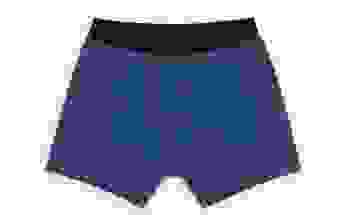
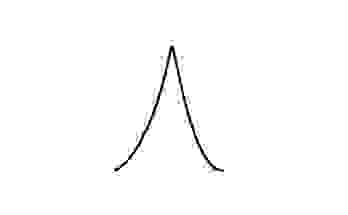

I’ve just been to Italy and fell in love with the country! With a view to returning next year, I’ve started the Italian course on Duolingo. I’m not aiming to be a professor in Italian, I just want to learn to converse and understand and get the most out of our travels! I’m enjoying Duolingo, but a tip for me (it might be to do with how my brain is wired, and may not be required by everyone) is to write notes as I go. Once I structure things my own way and it’s written by my own hand, it’s easier for me to understand, and I find I’m loving it and retaining information. Might be a handy tip for less academic/more practical people similar to myself!
That would definitely be good with the verb conjugation. Studying those charts is incredibly helpful, and not something Duolingo does on its own.
Have you tried the Linkword language learning which instead of using repetition as the main learning tool uses word association with images as it’s main learning technique.
I haven’t, but I’ve heard of quite a few options out there. I’m trying to keep track of them all, but it’s getting a little tricky.
Hi, would you be more specific about those options please; maybe list “the Linkword language learning” programs out there w/ url links?
I’ll take a look at that one. I’ve also heard of HelloTalk, LiveMocha, and other sites like italki, but I haven’t given them all a try.
Hello thank you for your review but can you help em with something, I really want to learn russian but for what did you ahve said Babel will introduce you only to the basics and I want to speak russian like a native. Does babel have this option?
Roseta Stone have a full russian course
what do you think is best for me
Thank you for your help
Duolingo. It has a full Russian course. The only downside is that it doesn’t teach you the alphabet, so you’ll have to learn that somewhere else. It’s not as hard as it looks, though. You’ll probably also have to learn the transliteration rules, so that you can type Russian letters with an English keyboard. It’ll take some getting used to, but again, stick with it.
Hey, snarky-has Babel improved it’s intermediate Russian course since 2015? I studied Russian before and I’d like to do better, so I’m considering babel or Rosetta Stone . What do you think?
I haven’t checked since then, but Duolingo has added Russian and it works quite nicely. You have to figure out how to deal with the keyboard (or learn the transliteration rules), but it’s great.
All sounds great until I see your REFERRAL link. Do you understand what conflict of interest is? Did you learn that in another language?
All is well in the world of money. If you get a cut from every user who joins from your referral link, it certainly would appear that it’s in your best interest to plug away like you have.
Fool me once, shame on you. Fool me twice, shame on me.
This is a pretty negative review. I had better things to say about Duolingo, which is totally free, with no referral program. If I were being dishonest about it, I would have done the opposite.
I freaking LOATHED Duolingo for exactly the reasons you stated above. I’ve recently got the itch to brush up on Spanish and French so I’m curious about Babbel. Now that it’s been about 3 years, have you found that Babbel has improved on these points since your original review? If not I’m just gonna go back to the books.
Firstly, Duolingo has improved on some of the points; they now offer some pretty good grammatical details regarding the finer points. As for the other complaints, not so much. I haven’t revisited Babbel since this review, so I’m not sure if they’ve changed significantly, but it’s worth a try if you can get a free trial.
I have a question about Babble. I am contemplating using it to improve my (Brazilian) Portuguese, but I was wondering––do the modules just start you off at the beginning, regardless of your prior knowledge, or do they tailor the lessons according to your knowledge level at the outset? I finished Duolingo’s Portuguese already, so I really don’t want to do a repeat of the stuff I’ve already learned. And I am also wondering if paying for this service is worth it, because Duolingo, while convenient and easy, is not the best language teacher and I’m not sure if Babbel will be either….Thank you for this article!
You can skip ahead. I think they have trial versions, so that might be worth a shot, especially if you’re not that excited about Duolingo.
A couple other people have recommended Anki App to me for flash-card style vocabulary practice.
Hey Snark,
First read, like your tone… LOL
Seems to me, if the rest of the Babbel Russian levels had followed the Beginner level’s format, and thoroughness, you would have endorsed it, “with viga!”. LOL
Very good analysis, and review. The same thought rattled around my head at each numbered point. This post should be read by everyone who has complained about teacher costs, etc. It’s not so easy to teach people well, and do it effectively, and efficiently. There’s skill, talent and science involved, and your review recognized and analyzed it very well.
Guess this means I gotta look around your domain, and check out your other topics.
Later,
GeoD